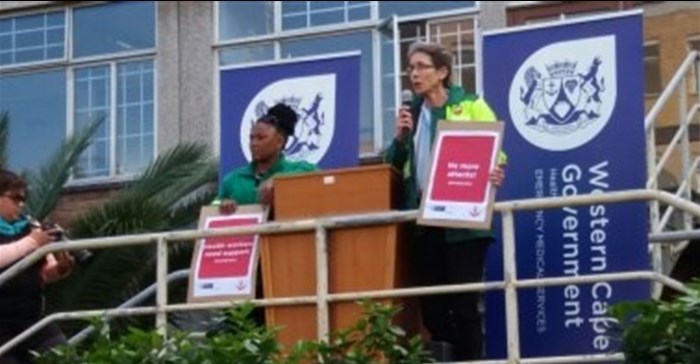
Subscribe & Follow
#AfricaMonth
In the news
WC plans to improve health worker safety

Health MEC, Dr Nomafrench Mbombo, launched Operation Khuseleka (to protect), a staff safety initiative aimed at encouraging cooperation within broader society to help keep health workers safe. No individual or group can guarantee the safety of health workers, but a whole-of-society approach can make a difference.
Working with partners
The department has in the past found that attacks on EMS staff were more likely to be linked to gang activity, whereas updated stats show an increase in the number of robberies and assault with a weapon. Extensive engagements are ongoing with the South African Police Service, community police forums, the department of community safety and various other safety organisations.
These partners supply real-time information and intelligence about the situation on the ground in all areas. This arrangement remains in place and EMS teams have the option to call for assistance, or may opt to wait for a situation to be normalised prior to entering an unsafe area.
In cases where the situation in an area is deemed too unsafe for emergency staff, patients are informed that the response will be delayed due to safety concerns. The impact on our EMS response times, however, may cause life-saving services to be delayed – which is why we require maximum support from communities, police, and other community safety groupings.
Improved safety technology on ambulances includes consoles which contain tracking devices and other security features. The addition of this technology has assisted in crews being quickly assisted in emergency situations. There have also been 10 successful arrests made this year, due to the technology and help from the community.
Reduced working hours for junior doctors
Another major safety concern is the issue of safe work hours for doctors. The move was prompted largely by the death of a young doctor when she fell asleep behind the wheel of her car after a long shift.
To date, the Western Cape has been following (Health Professions Council of South Africa (HPCSA) guidelines on working hours for young doctors. Rather than wait for national guidelines to be amended, the province has decided to shorten the length of shifts for its staff – a move that has been supported by associations representing medical staff.
Dr Mbombo said: “We can confirm that we have heard and adhered to the plea of young doctors about their working hours. Together we have come up with a solution, which is now being implemented. As a result, working hours will no longer exceed a 24-hours shift. This arrangement is set for implementation by 1 January in all state hospitals in the Western Cape and is in line with the requests received from various organisations, including the South African Medical Association (SAMA) and the Junior Doctors Association of South Africa (JUDASA).”
“The solution was also reached through consultation with our higher education partners. It is a great improvement on the current 30 hours shifts that are stipulated in the national guideline set by the council. This shows the commitment of the department provincially towards improving conditions of staff in the Western Cape,” Mbombo added.
Related
Plastic is good when we're good with plastic 25 Feb 2025 2024 was record low for mining fatalities 24 Jan 2025 Brand safety, signal loss dominate concerns as Warc releases The future of programmatic 2024 report 14 Aug 2024 #WomensMonth: South African mining industry takes big step in fight against GBVF 4 Aug 2024 Opposition mounts against NHI Bill 15 May 2024 TikTok and AU Commission launch #SaferTogether for digital safety in Africa 18 Mar 2024








